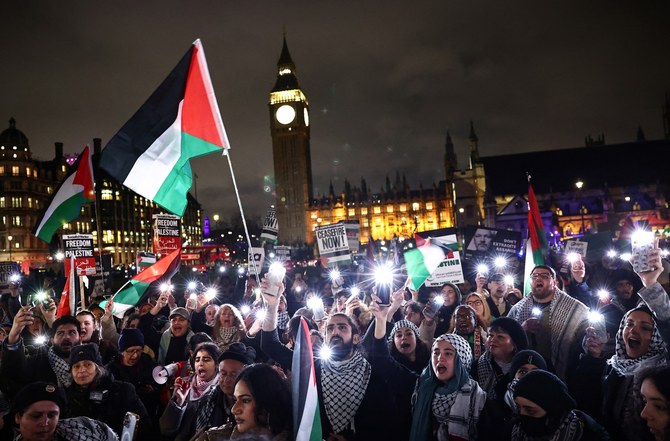Mohamed Chebaro
Extremism, terrorism, incitement and hate speech should have no place in any society. But Britain’s new definition of extremism offers little in terms of clarity of purpose as to how it could help the country become safer. Or how it will help the UK’s many religious and ethnic communities to continue to coexist cohesively under properly defined and fair laws that allow all to live freely in peace and in a way that upholds the ethos of tolerance and respect for the country’s historically entrenched democratic values.
The unveiling of the new definition last week came, according to the government, in response to an “eruption” of hate crimes against Jews and Muslims in the country since Hamas’ Oct. 7 attacks on Israel. But many critics believe it risks infringing on people’s rights and freedom of speech, despite it being an answer to warnings expressed by Prime Minister Rishi Sunak last month, when he claimed that the UK’s multi-ethnic democracy was being undermined by both Islamist and far-right extremists.
Many justifications have been given as to the necessity and timing of the new extremism definition, but I believe that it is an effort by the UK government to stamp out pro-Palestinian protests and remove the Palestinian flags that have sprung up in many places, as Muslims and non-Muslims alike show their solidarity with Gaza, irking some pro-Israeli communities across the country. Some even think that this Conservative government is again trying to capitalize on the spreading of fear, this time from extremism, just like the fear from migration before that.
Communities Minister Michael Gove, whose department introduced the new definition, claimed that British “democracy and our values of inclusivity and tolerance are under challenge from extremist groups, which are radicalizing our young people and driving greater polarization.”
Gove’s new definition shifts the focus from sanctioning action to ideology. In 2011, the government’s “Prevent” strategy defined extremism as the “active opposition to fundamental British values, including democracy, the rule of law, individual liberty and the mutual respect and tolerance of different faiths and beliefs.”
The new definition says extremism “is the promotion or advancement of an ideology based on violence, hatred or intolerance, that aims to negate or destroy the fundamental rights and freedoms of others; or serve to undermine, overturn or replace the UK’s system of liberal parliamentary democracy and democratic rights.”
But critics, from the archbishop of Canterbury to former Conservative ministers and opposition parties, believe that the new extremism definition could be used to silence those who disagree with the government. They fear it could do more harm than good, stigmatizing Muslim groups, feeding the victimization syndrome of followers of the far right and maybe even criminalizing the activities of environmental activists.
The definition does not offer any new insights as to how law enforcement could better police the alleged no-go areas of London or prevent some fringe elements from demonstrating outside the homes of politicians and holding banners that reflect anti-Israel or anti-Jewish views. Gove’s distinction between Islam as a religion of peace and Islamism as a dangerous and destructive ideology was widely welcomed, but his naming of some specific Muslim groups simply for their views on the Israel-Hamas war could escalate anti-Muslim prejudices. This is especially the case when it comes from a party that itself is not entirely free from accusations of Islamophobia and racism.
As a journalist covering UK news since the early 1990s, I have repeatedly found myself surprised over the years at how tolerant various governments and local authorities have been in authorizing public rallies for “Islamist groups” such as Hizb ut-Tahrir, whose narrative is clearly rooted in anti-democratic, anti-liberal and even anti-British ideologies. My questions to officials from governments, the police and local authorities have repeatedly been repelled by saying that the UK prides itself on upholding the freedoms of expression and belief for all, as long as no violence is perpetrated on British soil.
Surely, that would be something to applaud if it was not also naive to believe that those groups were not bent on preaching, inciting and even recruiting and financing many activities that, if scrutinized, would not meet the most basic of “Britishness” tests.
From the days of the fatwa against author Salman Rushdie in the late 1980s to the proliferation of many “preachers of hate” that occupied newspaper front pages in the 1990s, official Britain has been sleepwalking into legitimizing some groups despite being warned about the threats they pose both domestically and abroad.
Furthermore, the UK has at times chosen to amplify the role of so-called moderate unelected Muslim community leaders at the expense of the established democratic and constitutional norms of representation. Muslims and everybody else in the country should be represented by their elected members of Parliament nationally and their councilors at the local level.
What is clear to many is that the new definition of extremism rests on poor foundations and it fails to eliminate threats, undo polarization and divisions, and reduce the increased assertion of competing identities, whether religious or ethnic. Many people tend to forget that civic responsibility imposes limits on every member of society’s freedoms, such as when they start infringing on the freedoms of others.
It is evident that the new extremism definition is, at best, counterproductive and will fail to weed out extreme Islamists or white supremacists. It is a distraction from the many failures of this Conservative government in an election year. I have a strong hunch that it is also a half-baked, half-thought-out drive to please some part of the electorate, who believe that they have seen too many Palestinian flags raised in various British streets in solidarity with people under bombardment for the past five months in Gaza.
Arab News







